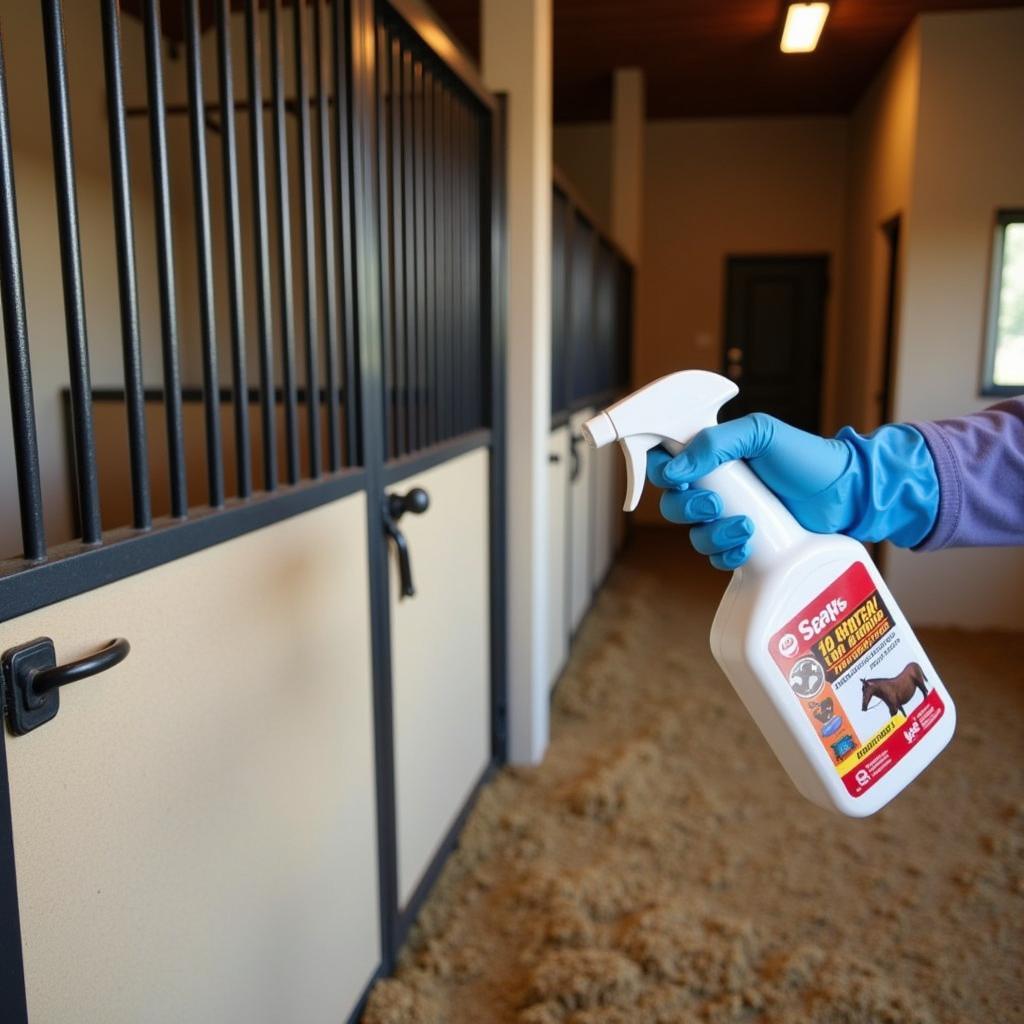Maintaining a fly-free horse stall is crucial for your horse’s comfort and health. Using the right Fly Spray For Horse Stalls not only protects your equine companion from pesky insects but also creates a more sanitary and pleasant environment. Let’s dive into the world of fly sprays and discover the best options for your barn.  Applying fly spray in a horse stall
Applying fly spray in a horse stall
Understanding the Importance of Fly Spray for Horse Stalls
Flies are more than just an annoyance; they can transmit diseases, cause skin irritations, and create stress for your horses. A quality fly spray for horse stalls acts as a barrier, deterring flies from entering and breeding in the stall. This preventative measure contributes significantly to the overall well-being of your horse.
Factors to Consider When Choosing a Fly Spray
Selecting the right fly spray for horse stalls requires considering various factors. The active ingredients, the duration of effectiveness, and the safety of the product for both your horse and the environment should be carefully evaluated.
- Active Ingredients: Look for fly sprays containing pyrethrins, permethrin, or natural ingredients like essential oils. Understanding how these ingredients work will help you make an informed decision.
- Duration of Effectiveness: Some fly sprays offer protection for a few hours, while others can last for days or even weeks. Consider your horse’s needs and the frequency of application when choosing a product.
- Safety: Choose a fly spray that is safe for your horse, other animals, and the environment. Always follow the manufacturer’s instructions carefully.
Types of Fly Sprays for Horse Stalls
Various types of fly sprays are available, each with its own advantages and disadvantages.
- Ready-to-Use Sprays: These are convenient and easy to apply. They are ideal for quick and targeted treatments.
- Concentrates: Concentrates offer a cost-effective solution as they are diluted with water before use. This option is great for larger barns or frequent applications.
- Automatic Misting Systems: For ultimate convenience and consistent protection, automatic misting systems provide regular doses of fly spray throughout the day.
Creating a Fly-Free Zone in Your Horse’s Stall
Fly spray is only one part of the equation. Implementing a multi-pronged approach is the most effective way to control flies in your horse’s stall.
- Regular Cleaning: Remove manure and soiled bedding daily.
- Proper Ventilation: Ensure adequate airflow to discourage flies.
- Fly Traps: Use fly traps as a supplemental control measure.
- Manure Management: Compost or dispose of manure properly to prevent fly breeding grounds.
“A clean stall is a happy stall,” says Dr. Emily Carter, DVM, specializing in equine health. “Regular cleaning and proper ventilation are fundamental to fly control.”
Natural Fly Spray Alternatives for Horse Stalls
For those seeking natural options, several alternatives can help repel flies.
- Essential Oils: Certain essential oils like citronella, lavender, and tea tree oil have natural insect-repelling properties. Mix these oils with water and spray them in the stall.
- Vinegar and Water Solution: A simple mixture of vinegar and water can also deter flies.
- Fans: Fans create airflow that makes it difficult for flies to land and stay in the stall.
“Natural fly repellents can be an excellent choice for horse owners looking for environmentally friendly options,” adds Dr. Carter. “However, it’s crucial to choose high-quality essential oils and follow proper dilution guidelines.” Remember, while these natural methods can be effective, they may require more frequent application than commercial fly sprays. You can also use a wipe horse fly repellent when you’re out camping and horses. If you’re interested in other horse care products, you might want to learn more about what’s a safeguard horse or discover a blue spray for horses. Additionally, you can explore resources on how to deal with western horse fly.
Conclusion
Choosing the right fly spray for horse stalls is essential for your horse’s comfort and well-being. By understanding the different types of fly sprays and implementing a comprehensive fly control strategy, you can create a healthy and fly-free environment for your equine companion.
FAQ
- How often should I apply fly spray in my horse’s stall? This depends on the product and the severity of the fly problem. Refer to the manufacturer’s instructions for guidance.
- Are natural fly sprays as effective as chemical ones? Natural fly sprays can be effective, but they may require more frequent application.
- Can I make my own fly spray for horse stalls? Yes, you can create DIY fly sprays using essential oils or vinegar and water.
- What are the common side effects of fly spray on horses? Some horses may experience skin irritation or allergic reactions.
- What should I do if my horse ingests fly spray? Contact your veterinarian immediately.
- Can I use the same fly spray on my horse and in the stall? Some fly sprays are formulated for both uses, while others are specifically designed for stall application. Check the product label.
- Where can I buy fly spray for horse stalls? Fly sprays are available at feed stores, tack shops, and online retailers.
For further assistance, please contact us at Phone Number: 0772127271, Email: [email protected] or visit our address: QGM2+WX2, Vị Trung, Vị Thuỷ, Hậu Giang, Việt Nam. We have a 24/7 customer support team.